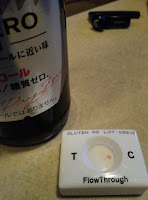 I was holding out hope that Asahi Super Dry might test negative for gluten, as Corona apparently has, but no such luck. It does, however appear to be very low in gluten, as evidenced by the very faint pink test spot on the left.
I was holding out hope that Asahi Super Dry might test negative for gluten, as Corona apparently has, but no such luck. It does, however appear to be very low in gluten, as evidenced by the very faint pink test spot on the left.
This bottle of Asahi Super Dry was purchased and tested (and later poured out) in Japan. The testing kit is the Imutest Gluten-in-Food test. Imutest claims it is sensitive down to 1-2 ppm for gluten, including hordein, the gluten present in barley. The folks at Imutest unofficially estimated that the gluten content of this beer is “probably less than 1 ppm,” provided I conducted the test properly.
Less than 1 ppm… that’s pretty low, considering that “gluten-free” beers generally need to be 20 ppm or less. Maybe I can have one or two of these once in a while.
HOWEVER, after some research and discussion, I've learned that this style of gluten testing, known as a sandwich ELISA test, is not as reliable as a competitive ELISA test, which must be done in a laboratory. I was told by Emily at Emport (US distributors of the GlutenTox testing kits) that "malting and fermenting can break apart the gluten protein in unpredictable ways." The folks at Imutest also advised me against using their testing kits to estimate gluten content.
THEREFORE, these test results may or may not be accurate. Perhaps if enough people test this beer, we'll get a better idea of its gluten content. If you do decide to test it, please leave a comment here.
NOTE: This test result was for Asahi Super Dry that was produced in Japan. Versions of Super Dry brewed elsewhere may or may not provide the same result, due to differences in ingredients, filtering, etc.
HOWEVER, after some research and discussion, I've learned that this style of gluten testing, known as a sandwich ELISA test, is not as reliable as a competitive ELISA test, which must be done in a laboratory. I was told by Emily at Emport (US distributors of the GlutenTox testing kits) that "malting and fermenting can break apart the gluten protein in unpredictable ways." The folks at Imutest also advised me against using their testing kits to estimate gluten content.
THEREFORE, these test results may or may not be accurate. Perhaps if enough people test this beer, we'll get a better idea of its gluten content. If you do decide to test it, please leave a comment here.
NOTE: This test result was for Asahi Super Dry that was produced in Japan. Versions of Super Dry brewed elsewhere may or may not provide the same result, due to differences in ingredients, filtering, etc.



